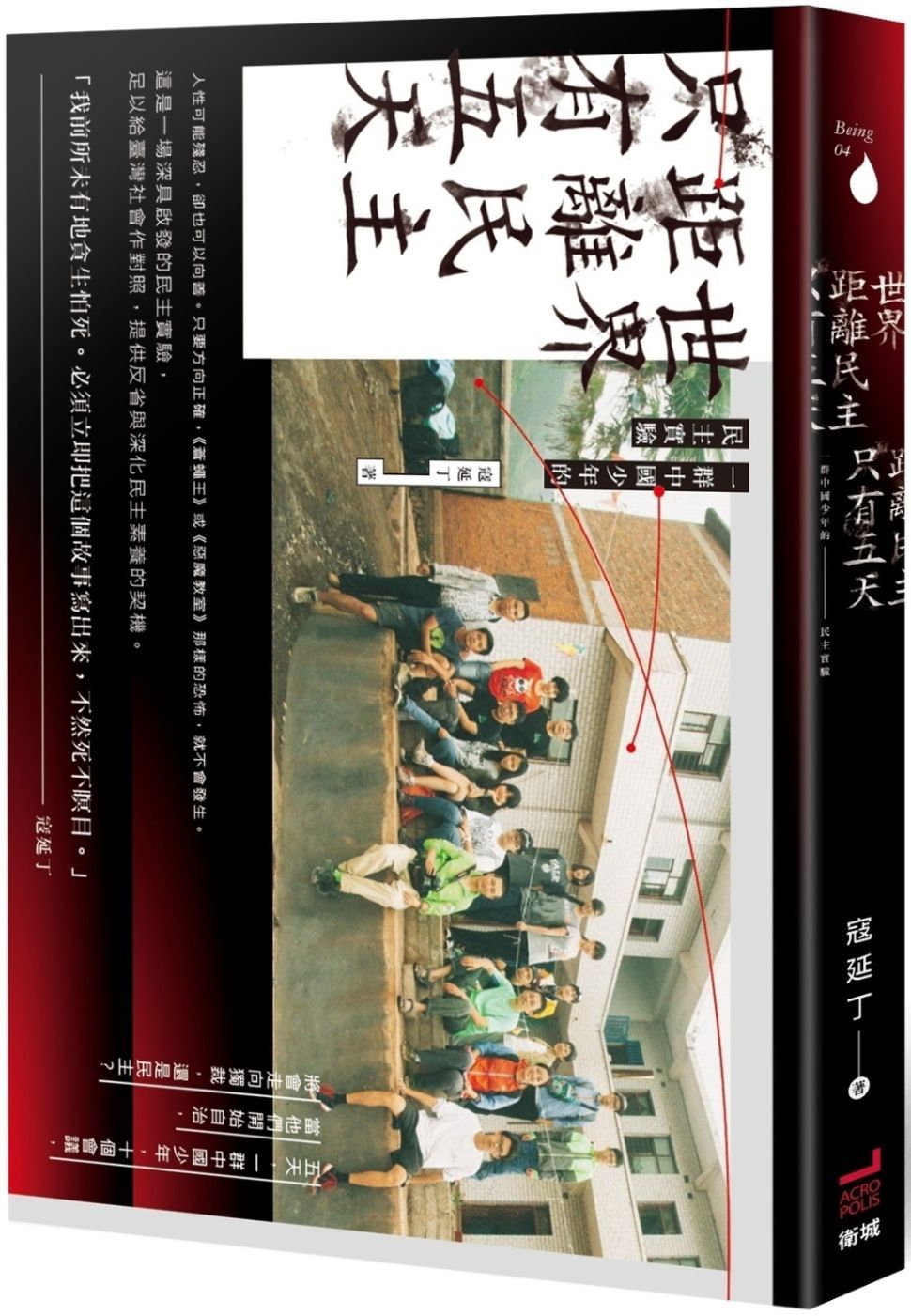Innate Democratic Cells——Read "The World is Only Five Days Away from Democracy: A Group of Chinese Teenagers' Democratic Experiments"

Title: The World is Only Five Days Away from Democracy: The Democratic Experiment of a Group of Chinese Teenagers Author: Kou Yanding Publisher: Acropolis Publishing (Taiwan)
Edition: May 2020
ISBN: 9789869889063
Do the Chinese deserve democracy? Is democracy the only imported product from the West, and the Chinese will be dissatisfied with copying the gourd, and the only way to become "democracy with Chinese characteristics"? These arguments all have a common premise, that is, democracy is "Western," or, as a principal said, there is no unified definition. If you've ever believed it for a moment, this book is an interesting reference indeed.
The background of the story is the experience of ten Chinese teenagers trekking to a remote rural school in Guizhou for public service in the summer vacation of 2016. However, this five-day itinerary is by no means pure public service. There is also an experimental trip between the author and Brother Tian who is familiar with the rules of procedure . There are also many authors from Shandong. They once founded several cultural and non-profit organizations in Beijing. They were detained in October 2014 for supporting social activities in Hong Kong (until they were released in mid-February 2015). They can also be regarded as active public knowledge in the Mainland in recent years. members.
Speaking of this group of teenagers, they all come from well-to-do families with affluent materials. Before participating in this public service, they have never received any education in democracy and constitutionalism, and they have no idea what the constitution should look like. This may also be the original intention of the experiment - to verify whether the Chinese have really failed to practice democracy.
When a group of people get together, they must first jointly formulate the basic norms that everyone agrees on, and putting them into society is the prototype of the constitution. In the process of repeatedly sculpting the text, it is nothing more than to explain that the rules cannot open the back door to interpret the original meaning of the legislation arbitrarily, but everyone can clearly understand it in black and white. As a result, a group of young people have established norms by talking about each other. As for the daily discussion of the details of public service, the first edition of "Robert's Rules of Procedure" (Robert's Rules) by American general Robert (Henry Martyn Robert, 1837-1923) as early as 1876 of Order, RONR) is the norm. Everyone does not speak at will, and the teenagers who take turns presiding over the meeting cannot express personal opinions or vote. There is a fixed number and time limit for speeches like a parliament. Everyone votes step by step according to the rules, and sets the direction for future common actions.
From the middle to the latter part of this book, there are more descriptions of how everyone practices "Robert's Rules of Procedure" and how to overcome the blind spots of mass thinking. The role of the rules of procedure is to balance the rights of all parties to speak, so that participants learn how to actively practice their own rights while respecting the ideas of others, protect the rights of minorities (especially dissidents), and realize their wishes through the discussion and voting mechanism. Sometimes motions put forward by individual people cannot be successfully put to a vote even if they are negotiated. Frustration and frustration are unavoidable in the process. However, the democratic mechanism cares about convincing people with reason, and if you do solid lobbying and debate beforehand, it will be easier to achieve success.
However, this journey is not just a leisurely summer vacation for teenagers. Walking with parents will inevitably be interfered by adults. The author and Brother Tian deliberately asked adults to avoid the meeting, preferring to explain the details of each meeting in short text afterwards. It's not that I haven't tried it before with adults present, but because the teenagers can't speak freely after seeing each other, they have to issue the order to evict the guests. Facts have proved that young people are not thought puppets without their own opinions. They sometimes have original ideas or break through blind spots, but they cannot thrive under the "close care" of adults. Once the shackles are released, it is naturally a true performance.
Democracy is often said to tend towards the tyranny of the majority, but this statement usually forgets that democracy has the self-adjusting ability to correct mistakes. In the book, there were also frivolous and funny resolutions. In retrospect, everyone felt that the resolutions were too much, and then proposed amendments to make the provisions clearer, so as to avoid similar incidents from happening again. This is the difference between dictatorship and democracy - the former can make mistakes again and again and never change; the latter does not forget the past and is vigilant against past mistakes, thereby bringing a better future and well-being to society.
The conclusion of the five-day experiment is simple: the spirit of democracy is not a function word that is different from others and resorts to ambiguity, nor is it an untouchable field of civic education. Simple things on campus, such as the selection of class representatives and club representatives, are essentially involved in democratic elements. The problem is how adults can guide them from the sidelines. The world is only five days away from democracy, and democracy is only five words away from dictatorship. The seeds buried in the ground also need to be watered regularly to break out of the ground.
Let's encourage each other.
Like my work? Don't forget to support and clap, let me know that you are with me on the road of creation. Keep this enthusiasm together!
